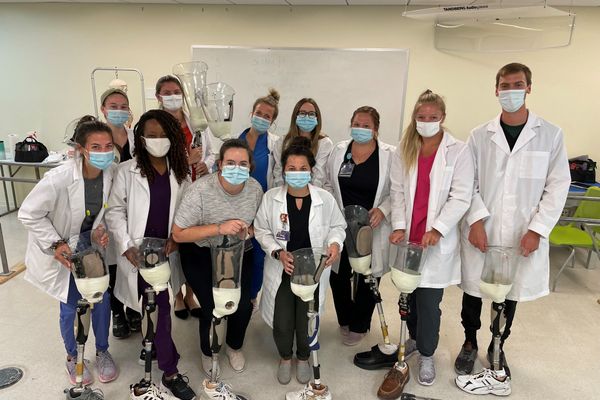Furman Alumna Lydia Morris ’20 is currently pursuing a Masters in Orthotics and Prosthetics at Northwestern University, where she is learning about inclusionary practices and advocacy for people with amputations.
Her initial interest in orthoses and prostheses began in middle school when she wore a back brace for her scoliosis. This led Morris to further explore the field as a potential career. While at Furman, Morris played for the Furman Women’s Volleyball team and majored in Health Sciences. Despite her schedule as a student athlete, Morris completed two Health Sciences internship courses, racking up a total of 380 internship hours. In addition to strengthening her grad-school application, Morris shared that these opportunities helped her to “see what it was like in the offices” and affirmed her love for the field.
Morris explained that the Master in Orthotics and Prosthetics focuses on human anatomy, determining what type of orthosis and prosthesis each patient needs and how to cast each patient – considering any modifications necessary to help patients reach their individual goals for functioning. Since April, Morris has been working with patient models that work with the Northwestern University Prosthetics-Orthotics Center (NUPOC). “It’s empowering to see them walking on a leg you made for the first time,” Morris shared.
Morris is looking forward to working in a clinical setting with other patients with amputations. “The majority of lower limb amputations are due to dysvascular complication, but there are many due to trauma and congenital deformities,” Morris explained. Similarly, the process of building and fitting orthoses and prostheses reflects the uniqueness of each patient.
Inclusion and advocacy are critical in this field, Morris explained, “but probably not in the way you would think.” She explained that in writing notes for insurance companies, Prosthetists and Orthotists must defend their decisions regarding their patients, such as why a patient requires a specific type of socket, knee or foot based on their living needs. “We have to advocate for our patients as to why they need these specific components,” Morris stated, “otherwise the insurance company will not pay for it.”
Morris encourages current Furman students considering careers that emphasize accessibility and disability advocacy to “speak up for those who might not know what they need.” Her experience at NUPOC has increased her awareness of accessibility issues in her environment, and she hopes to use the knowledge and experience she gains from her graduate program to empower and support individuals with disabilities in the future.
